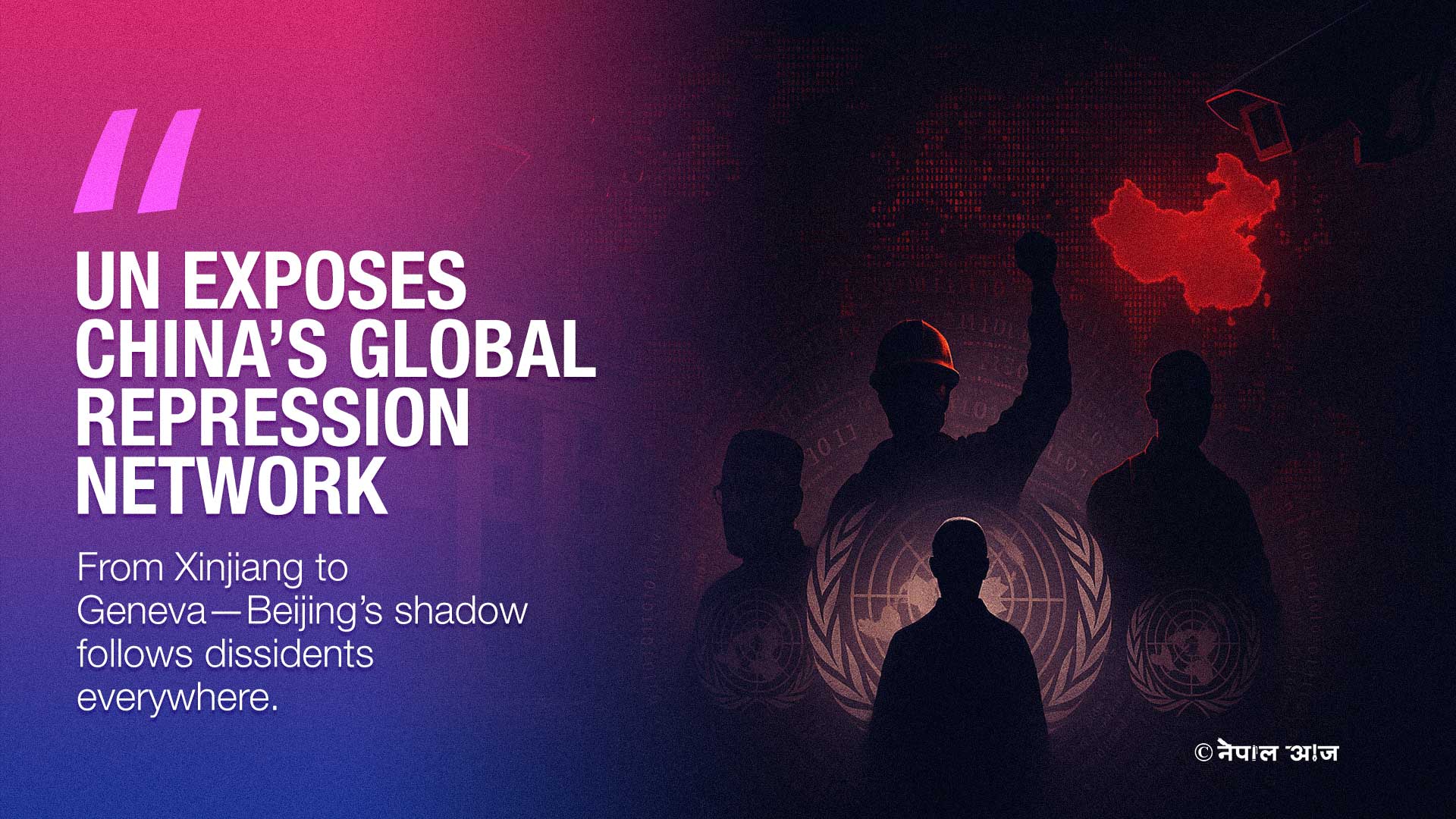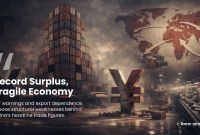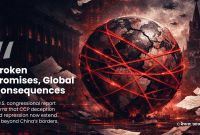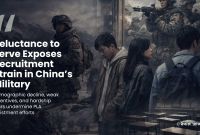New UN report exposes China’s expanding network of transnational repression against human rights activists

The latest United Nations report on reprisals paints a deeply troubling picture of how authoritarian regimes are extending their coercive reach beyond their borders.
China, prominently named in the report, emerges as a key perpetrator of transnational repression—a sophisticated campaign to intimidate, silence, and punish human rights defenders, journalists, and dissidents even when they are far from the country’s physical boundaries.
The findings mark one of the most comprehensive U.N. acknowledgements yet of Beijing’s use of global institutions, including the U.N. itself, to undermine international advocacy for human rights.
The annual report, prepared by the Office of the High Commissioner for Human Rights (OHCHR), documents cases from more than two dozen countries.
It highlights not only the direct targeting of activists but also the indirect harassment of their families, colleagues, and entire diaspora communities. For many, exile is no longer a guarantee of safety.
Through intimidation, surveillance, and public smear campaigns, China’s actions reveal a clear intent: to ensure that criticism of its human rights record—particularly concerning Uyghurs, Tibetans, Christians, and Hong Kong democracy advocates—never escapes its control.
Uyghur activist faces reprisals beyond borders
Among the most disturbing examples cited in the report is the case of Uyghur linguist and activist AbduweliAyup, whose experiences underscore the risks faced by those who dare to engage with international platforms.
Ayup, who fled China in the mid-2010s after spending 15 months in detention, has long been a vocal advocate for the preservation of the Uyghur language and culture.
His academic work has frequently drawn attention to Beijing’s deliberate campaign to erode linguistic and cultural identity in the Xinjiang region.
At a U.N.-affiliated international language technologies conference in February 2025, Ayup spoke about the systematic suppression of the Uyghur language.
Following his intervention, he reported being confronted by unidentified individuals who questioned him about his family back in China—a thinly veiled act of intimidation meant to signal that the regime’s eyes remain on him, even abroad.
Soon after, Ayup learned that his research presentation had been “administratively delayed,” forcing him to present informally during a coffee break. He later noticed that he was being filmed without consent and followed throughout the event.
While UNESCO later described the incident as a “miscommunication,” the U.N. report categorises it as a potential reprisal, part of a broader pattern of transnational harassment directed at those who engage with U.N. mechanisms.
The experience left Ayup shaken and cautious—a testament to the far-reaching power of state intimidation.
Hong Kong activists targeted through sophisticated retaliation
The report also details the ordeals of Hong Kong pro-democracy activists Carmen Lau and Anna Kwok, both of whom have become prominent figures in international human rights advocacy.
Their involvement with U.N. bodies and global campaigns for Hong Kong’s autonomy has made them prime targets of Beijing’s retaliation.
In December 2024, Hong Kong authorities labelled them “fugitives” and placed bounties on their heads for information leading to their arrests—an unprecedented escalation that weaponises the city’s security laws beyond its jurisdiction.
Both activists subsequently had their passports revoked, effectively trapping them in legal limbo.
Lau reported being subjected to digital surveillance and smear campaigns, while her family members in Hong Kong endured repeated visits and questioning from police.
In March 2025, an AI-generated video depicting Lau making fabricated statements surfaced online and was circulated widely on Chinese social media, amplifying the psychological pressure on her and her supporters.
Such tactics, blending traditional state repression with new technologies, reveal the evolution of authoritarian control—where intimidation is no longer limited to arrests or physical threats, but extends into virtual spaces, reputation sabotage, and manipulation of truth itself.
Exploiting global institutions
One of the most striking concerns raised by the U.N. report is how some states, including China, are allegedly exploiting international institutions such as the U.N. and Interpol to legitimise or facilitate acts of repression.
The report describes how repressive governments submit misleading information to trigger red notices or use procedural mechanisms to block participation by dissidents in global forums.
In the context of China, these tactics form part of a systematic strategy—to sanitise its image on the global stage while undermining international human rights norms from within.
Experts argue that such manoeuvres are not accidental but deliberate, reflecting a long-term plan to neutralise critical voices and discourage engagement with U.N. mechanisms designed to hold states accountable.
As RaphäelViana David of the International Service for Human Rights noted, the pattern represents a “growing recognition within the U.N. that transnational repression is not merely incidental—it is a deliberate foreign policy tool.”
Beijing’s reach has expanded through economic leverage, diplomatic pressure, and surveillance capabilities, allowing it to monitor and retaliate against individuals who would otherwise be beyond its jurisdiction.
A chilling effect on global advocacy
Beyond individual cases, the report highlights the collective psychological impact of transnational repression.
For many activists, the fear of retaliation has become a daily reality that shapes how they communicate, organise, and participate in international advocacy.
The U.N. warns that this chilling effect undermines its own mission by deterring engagement from those most affected by human rights abuses.
For Uyghur, Tibetan, and Hong Kong diasporas, the repression extends to entire communities.
Families in China face surveillance, job loss, or arbitrary detention simply because a relative abroad has spoken out. Such collective punishment reinforces silence, making dissent increasingly rare and dangerous.
The report situates this within a broader global trend: authoritarian states learning from one another and sharing methods of repression, including cyber operations, passport invalidations, and disinformation campaigns.
China’s approach—highly resourced, technologically advanced, and legally framed under the guise of “national security”—is now seen as a model for other regimes seeking to control exiled critics.
Beijing’s persistent campaign of control
The U.N. report reiterates that Beijing’s domestic human rights abuses remain at the core of its international behaviour.
The persecution of Uyghurs in Xinjiang, Tibetans, and Christians, as well as the ongoing dismantling of civil society in Hong Kong, provides the ideological foundation for the state’s external intimidation.
By criminalising dissent and equating criticism with subversion, China has normalised the idea that loyalty to the Party supersedes all other rights—even beyond its borders.
The transnational dimension of this repression is thus not an extension, but a continuation of domestic authoritarian logic applied globally.
In its assessment, the U.N. underscores that the cases it documented represent only a fraction of what is occurring. Many victims do not report harassment for fear of retaliation or disbelief.
Those who do often find little recourse, as the perpetrators operate through opaque networks of proxies and diplomatic channels that obscure accountability.
The new U.N. report exposes the disturbing reality that China’s repression no longer stops at its borders.
Through a blend of surveillance, intimidation, and exploitation of international mechanisms, Beijing has constructed an apparatus of global control designed to silence dissent wherever it arises.
The stories of AbduweliAyup, Carmen Lau, and Anna Kwok are emblematic of a broader campaign that seeks to rewrite the boundaries of state power in an interconnected world.
In documenting these patterns, the U.N. has illuminated a grim frontier of human rights violations—one where the promise of safety in exile has become an illusion, and where the machinery of fear follows those who dare to speak against it.
Uyghur UN



![From Kathmandu to the World: How Excel Students Are Winning Big [Admission Open]](https://www.nepalaaja.com/img/70194/medium/excel-college-info-eng-nep-2342.jpg)
